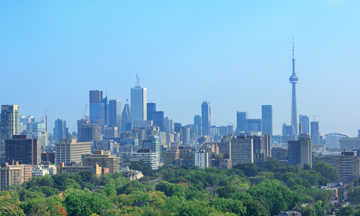Earlier this week the Toronto Real Estate Board (TREB) released the January Market Watch report with encouraging statistics for January 2019 home sales data in the Greater Toronto Area. There were 4,009 home sales through TREB’s MLS® in January 2019. This is an increase of 0.6 per cent compared to January 2018. This is also an increase in sales volume by 3.4 per cent compared to December 2018.
“It is encouraging to see the slight increase in January transactions on a year-over year basis, even with the inclement weather experienced in the GTA region during the last week of the month. The fact that the number of transactions edged upwards is in line with TREB’s forecast for higher sales in calendar year 2019,” said Mr. Garry Bhaura. President of TREB.
The average selling price was up by 1.7 per cent on a year over year basis. The condominium apartment market segment continued to lead the way in terms of price growth.
Year-Over-Year Summary
| 2019 | 2018 | %Change | |
| Sales | 4,009 | 3,987 | .6% |
| New Listings | 9,456 | 8,561 | 10.5% |
| Active Listings | 11,962 | 11,894 | 0.6% |
| Average Price | $748,328 | $735,874 | 1.7% |
| Average DOM | 33 | 32 | 3.1% |
“Market conditions in January, as represented by the relationship between sales and listings, continued to support moderate year-over-year price increases, regardless of the price measure considered. Given housing affordability concerns in the GTA, especially as it relates to mortgage qualification standards, we have seen tighter market conditions and stronger price growth associated with higher density low-rise home types and condominium apartments, which have lower average selling prices compared to single detached homes,” said Jason Mercer, TREB’s Director of Market Analysis and Service Channels.
In the City of Toronto, the biggest issue is the lack of supply which continues into 2019. Active listings are up 3.3 per cent over January 2018. If inventory levels remain low this will continue to facilitate price growth in the 416 area.
The average price is rising across most segments in the 416 area. Semi-detached houses and townhouses rose by 6.1 and 12.3 per cent respectively. Condominium apartments increased by 8.8 per cent. The only segment that was down were detached homes, with an 8.8 per cent decline. The average price of a detached home though is $1,174,134 so this segment is getting unaffordable for a lot of buyers.

Looking ahead, TREB is forecasting a rebound in sales for the GTA in 2019. Buyers started to return to the market in the second half of 2018 as the market started to stabilize after the introduction of the mortgage stress test by the federal government at the first of the year along with interest rate increases during the year. This had a big impact on a lot of buyers. First-time buyers especially were having difficulty qualifying for loans under the new mortgage stress test as they had to show they could still afford their mortgages if interest rates were to rise two percentage points. A lot of buyers had to adjust the type of home they were planning to purchase. A recent Ipsos Group survey found 43 per cent of buyers intended to buy a less expensive home than originally planned and 31 per cent said they would shop in a different location. Only 18 per cent said the new rule had no impact on their ability to qualify for their intended home.
John DiMichele, TREB’s chief executive officer is requesting the federal government to reevaluate the mortgage stress rule. With the interest rate increases in 2017 and 2018 it is unlikely that buyers would face an additional increase of 2 percentage points any time soon setting the qualification bar at an unreasonable level. The Bank of Canada held the interest rate at the first of the year and it appears will not be raising rates soon.
The Toronto Real Estate Board predicts moderate growth in 2019 with homes sales of 83,000 which is an increase of 7.3 per cent over 2018 sales volume. They further predict the average selling price of a home will increase to $820,000 this year which is a rise of 4.2 per cent from the average selling price of $787,195 in 2018. This average is for all home types including condominiums and detached homes.
These forecasts are based on the Ipsos Group Survey that showed more buyers considering a home purchase this year, as well as the continued population growth in the GTA, low employment rates and lower average interest rates for five-year fixed mortgages.
Even though there are recessionary signals on the horizon many of the factors that have helped keep Toronto’s house prices high are still influencing prices today. It is interesting to look at the price history over the past five years for the GTA. These average prices include all types of homes. Even though prices declined in 2018 we are still well ahead of prices from 2016.

Specifically, Toronto’s population growth has surged over the past couple of years. The Government of Ontario in recent report forecast the GTA will grow in population from 2017 to 2041 by 2.8M people making the total population of the GTA 9.7M people. This is an increase of 40.8 per cent.
The technology sector alone has grown by over 50 per cent in the GTA over the last five years and there is no sign of it slowing down according a new report from BMO Capital Markets. In 2017 Toronto reportedly added more tech jobs than San Francisco, Seattle and Washington DC combined. We are currently home to roughly 214,000 tech workers, making it the fourth-largest tech market in North America. Toronto is well known for its culture, education and diversity however the most important component of Toronto’s success is its talent, which continues to attract international tech giants like Google, Apple and Amazon. A relatively open Canadian immigration policy has helped attract tech talent to the GTA too that may have otherwise ended up south of the border. These factors are helping keep the demand for homes high in a tight supply market.
Over the past two years we can see how these factors impacted Toronto’s housing market. When house prices started falling in 2017 after they peaked in March, the downward trend in prices stopped just four months later in July. Since July 2017 prices in the GTA have been stable.
This is not the norm as when housing bubbles pop, the decline generally lasts longer than four months. Also, as highlighted earlier, when the mortgage stress tests were introduced at the first of 2018 we anticipated this to result in more downward pressure on house prices however it did not. Even though sales were down 40% year over year in March 2018 just three months after the stress test introduction, this did not affect home prices.
Even with the decline in sales, there continues to be an imbalance in the GTA. There are still more buyers looking to purchase homes than there are homes available on the market. Although this imbalance may not be strong enough to push prices much higher in the short term, it has been strong enough to keep home prices up. These factors will all continue to play a significant role in lessening the negative side effects of a potential recession in the coming year.
Down the line it is anticipated Toronto will continue to have a supply shortage. As Benjamin Tal, Deputy Chief Economist at CIBC World Markets, stated in October at the last TREB Annual Meeting, if you think Toronto is expensive now, wait five years as this supply shortage will drive prices up to levels unimaginable now. The smart money is buying now and holding for the long term.


